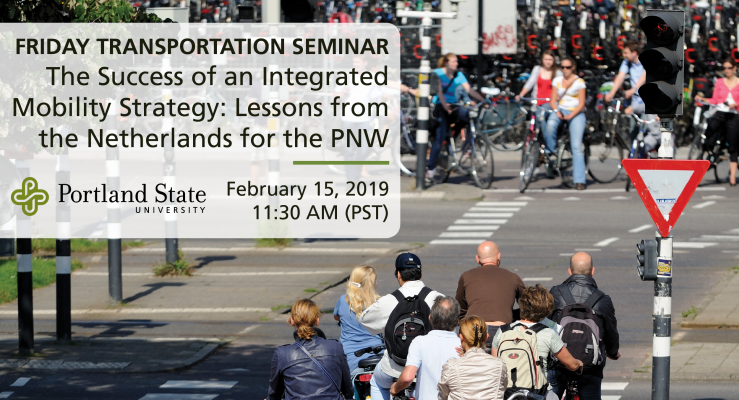
Friday Transportation Seminars at Portland State University have been a tradition since 2000. With the start of 2019, we're changing it up a bit! The seminar will be delivered 11:30 am (sharp) - 12:30 pm, with additional discussion over coffee and donuts (protect the planet—bring a mug!) from 12:30 to 1:00 pm. You can also watch online.
PRESENTATION ARCHIVE
Miss the seminar or want a look back?
LEARN MORE: STUDY IN THE NETHERLANDS
- Professional Study Abroad in the Netherlands, June 23–30, 2019
- Student Study Abroad in the Netherlands, June 23–July 6, 2019
THE TOPIC
The Netherlands sets the standard for their multimodal connectivity. It has world's highest use of cycling and an integrated mobility network with an efficient transport system. During this seminar, Lucas will tell more about the Dutch Approach and how this could be applied to the American transportation context.
Lucas will use the case of the Bay area to show this. The Bay Area in California currently faces massive challenges in transportation because of the enormous growth of the region. With the use of a new innovative modelling tool, the Move Meter (http://www.movemeter.com/), Lucas will show the potential of an integrated multi-modal mobility strategy for the Bay Region: it results in less congestion and a more sustainable mobility pattern. The realization of mobility hubs are important in this. During this presentation the results of the study will be presented. Moreover, a short preview is shown of what the application of this approach would mean for Portland.
KEY LEARNING TAKEAWAYS
- The successes and important elements of the Dutch multimodal integrated mobility strategy;
- The application of a multimodal mobility strategy in the American context results in a healthier, more sustainable and more equitable transport system;
- Mobility hubs offer possiblities for a more sustainable mobility pattern in Portland.
SPEAKER
Lucas van der Linde, Goudappel
Lucas van der Linde is a Consultant in Urban Mobility, working for Goudappel, the leading consultancy firm in urban mobility policies from Amsterdam, the Netherlands. He obtained his Masters degree in Urban and Regional Planning from the University of Utrecht in 2014, Cum Laude, and has worked in the field for four years. As a generalist, he works on a wide range of projects for governmental agencies and developers within the field of mobility in the Netherlands, Unitd and Sweden. This includes designing complete streets, bicycle planning and traffic modeling. In the past years he has specialized in ‘multimodal mobility hubs’, i.e. the concept for new major urban developments within current city boundaries in which high quality bicycle and public transport infrastructure in combination with low parking norms ensures that future inhabitants of those new neighborhoods have a sustainable mobility pattern.
PROFESSIONAL DEVELOPMENT
This 60-minute seminar is eligible for 1 hour of professional development credit for AICP (see our provider summary). We provide an electronic attendance certificate for other types of certification maintenance.
LEARN MORE
Sign up for our newsletter to receive monthly updates.
Lucas van der Linde is a visiting scholar, brought to Portland State University with support from the National Institute for Transportation and Communities (NITC). The NITC program is a Portland State-led partnership with the University of Oregon, Oregon Institute of Technology, University of Utah and new partners University of Arizona and University of Texas at Arlington. We pursue our theme — improving mobility of people and goods to build strong communities — through research, education and technology transfer. The Transportation Research and Education Center (TREC) at Portland State University is home to the National Institute for Transportation and Communities (NITC), the Initiative for Bicycle and Pedestrian Innovation (IBPI), and other transportation programs. TREC produces research and tools for transportation decision makers, develops K-12 curriculum to expand the diversity and capacity of the workforce, and engages students and young professionals through education.
